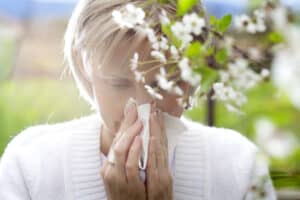
Potential Causes of Post-Nasal Drip
Virus or Infection
If you’ve ever had the flu or a common cold, you may know that unpleasant feeling of post-nasal drip. The reason mucus thickens when we are sick is that the body is trying to capture germs from the respiratory tract. If you suspect that post-nasal drip could be related to a cold or virus, one thing you can do is consume plenty of liquids. Yes, there really is some merit to that whole chicken soup strategy. If a cold persists beyond 10 days or if mucus becomes odorous, a course of antibiotics may be needed to address an issue such as a sinus infection.
Allergies
We are in that time of year when allergy-sufferers begin to prepare for the worst. Allergies to pet dander, pollen, grass, ragweed, or other substances are known for their effect on the eyes, nose, and throat. Some people with allergies also develop post-nasal drip when exposed to particular allergens. Avoidance is a strategy, though not one that offers many benefits. Adding a HEPA filter in the home may provide some relief, especially to pet allergies, but medication may be warranted if symptoms become persistent. If post-nasal drip is a common problem that you suspect may be related to an unknown allergy, your ENT doctor can perform simple tests to determine how to improve your quality of life.
There are several reasons why post-nasal drip may occur. When post-nasal drip becomes a problem, a medical examination and consultation are beneficial steps toward breathing easier. To learn more about allergy testing and treatment for post-nasal drip, call our St. Louis office at 314-582-0888.

